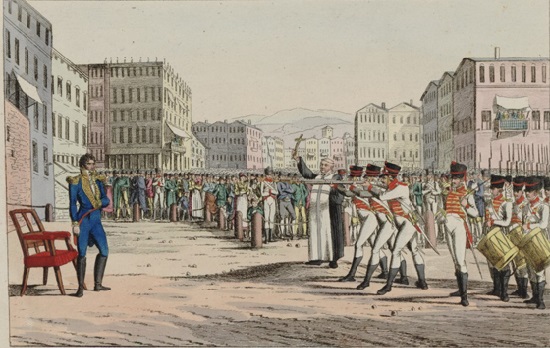
This unpublished account of the final days of Joachim Murat, former king of Naples, but captured in Calabria following a reckless attempt to regain his throne, comes from the British vice-consul at Pizzo, a certain Antonio Perri. The British, and many other European powers, had a network of representatives in the ports of Italy and Perri was resident in Pizzo, a little port in Calabria. It was there, in October 1815, that Murat landed with a paltry expeditionary force, was overwhelmed by a band of armed locals, and was executed following the sentence of a hastily convened court martial. Perri’s account is matter-of-fact and throws light on the execution itself. The myth has it that Murat told the firing squad to “aim for the heart, spare the face”. This is what he should have said, to remain true to his character, but the truth, as Perri describes it, was rather different:
Here is a brief account of the unhappy end of Gioachino Murat. During Thursday evening, at around half past six, a courier arrived from Naples for Marshal Nunziante and that a second and similar one arrived around nine, ordering him to convene a court martial to judge Murat and at the same time to gather witness statements so that events which took place since Murat’s arrival in this town might be set down. Before long the court martial was established consisting of Marshal Nunziante, eight captains or lieutenant-colonels and the Procurator-General from the criminal court at Monteleone. Murat’s followers were being held together in one cell whilst he was being held alone in a guarded room. An hour before the sentence was read out to him he knew of the court was determining his fate and requested an interview with Signor Annunziante but he sent word that he was not available at that time. Murat then lost patience and sent him a note but he replied that he was not in a position to receive any documents as it would compromise the case. Nothing further was said, however it was 12 hours after the arrival of the courier on the evening of the 12th and the court was due to conclude at 22 o’clock [Italian time ]on the 13th of this month. The Procurator General gave the verdict of death and this was unanimously agreed upon then and there by the court and so the sentence was read out to Murat by one of the members of the military tribunal to which he replied with the following words: ‘so Ferdinand wants me dead. What have I done? I am sorry, but how violently I have been treated by the court at Naples. Among others the Father Confessor then entered to take him to be confessed but Murat told him that hi sins were so great that only God himself could forgive them. The confessor replied saying ‘let us say confession, however, and be penitent. I shall, he said, and added something which gives the lie to those who might say otherwise, saying ‘I have lived as a Christian, and shall die a good Christian.’ He requested scissors so that he could cut off a lock of his hair to send to his wife but this was not permitted. The time for the sentence to be carried out had already passed as the orders from Naples had stipulated that there should just be 15 minutes between the sentence and the execution. They came then to inform him that the place of execution would be in the prison itself and brought him out of the room with a Neapolitan officer handing him a blindfold to cover his eyes but he did not want it. He came out to the designated place and he swung round to face the soldiers and, placing a hand on his chest, he commanded ‘open fire!’ and 12 muskets were fired at his chest. He died at once but they fired another three shots into his head when he lay on the ground.
His corpse was wrapped in some coarse cloth an taken to the church and there were no funeral rites, or any other religious ceremony, instead he was carried there on the shoulders of six soldiers, accompanied by a crowd of 15 or 20 people, and placed in a grave where the most common people are laid to rest in the church of Saint George. Thus he was treated in the way that the most infamous brigands were once treated. This is a true account of the miserable end of Gioachino Murat.